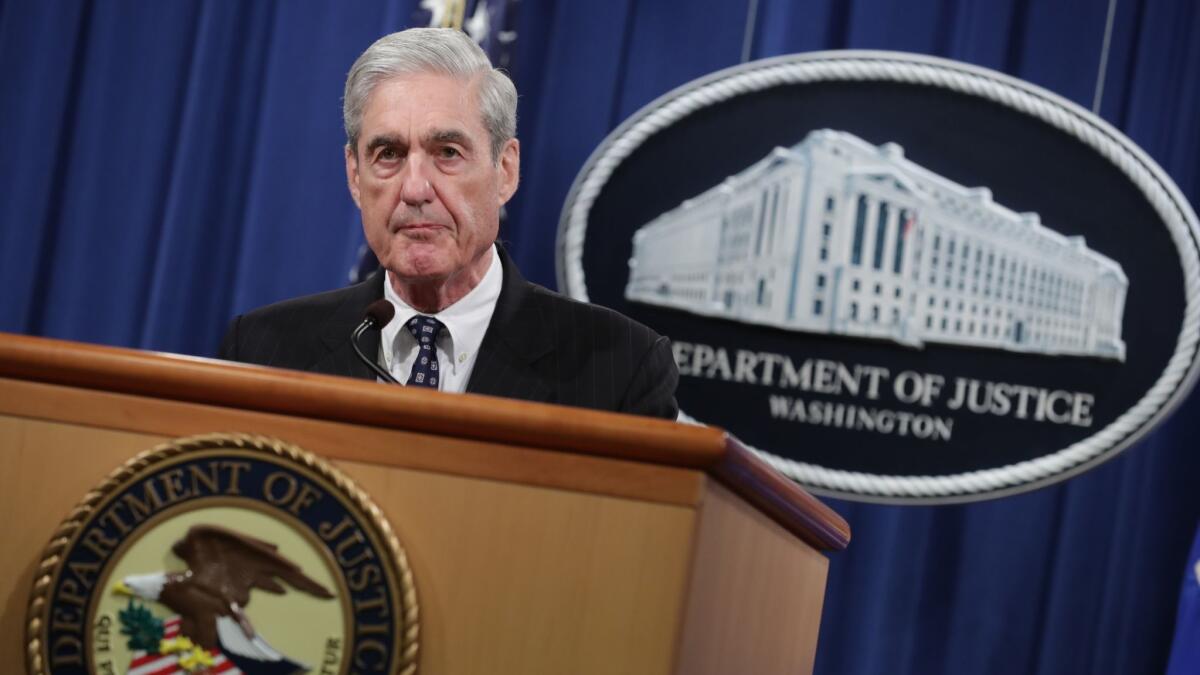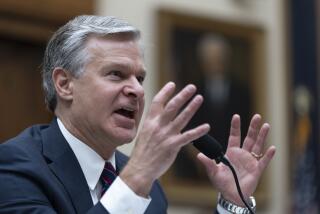Robert Mueller to testify publicly before Congress on July 17

- Share via
Reporting from Washington — Former special counsel Robert S. Mueller III, who spent nearly two years leading the Russia investigation, has agreed to testify publicly before Congress on July 17, setting the stage for what will probably be the most anticipated day on Capitol Hill in recent memory.
The announcement was made Tuesday evening by Rep. Jerrold Nadler (D-N.Y.), chair of the House Judiciary Committee, and Rep. Adam B. Schiff (D-Burbank), chair of the House Intelligence Committee. They said the agreement was reached after they issued Mueller a subpoena.
“Americans have demanded to hear directly from the special counsel so they can understand what he and his team examined, uncovered, and determined about Russia’s attack on our democracy, the Trump campaign’s acceptance and use of that help, and President Trump and his associates’ obstruction of the investigation into that attack,” they said in a statement.
Mueller had been reluctant to appear on Capitol Hill. During his only public statement before stepping down as special counsel last month, he said he hoped it would not be necessary.
“The report is my testimony,” Mueller said. “I would not provide information beyond that which is already public in any appearance before Congress.”
But Democrats were adamant that the former special counsel publicly describe his findings and answer questions after leading an investigation that was the subject of intense scrutiny. They hope his testimony will refocus attention on what his team’s investigation uncovered.
In the report, Mueller said there was not enough evidence to establish a criminal conspiracy between Trump’s campaign and Moscow. He found that Russian operatives tried to boost the president’s candidacy by spreading divisive disinformation on social media and releasing hacked Democratic Party emails at key moments.
But the report did show that Trump’s team welcomed Russia’s illegal assistance.
In addition, Mueller said his report “does not exonerate” the president on the question of whether he broke the law by trying to obstruct the investigation. The report included detailed evidence that Trump tried to limit the inquiry “to prevent further investigative scrutiny of the president’s and his campaign’s conduct.”
Mueller declined to say whether Trump committed a crime in that regard, citing Justice Department guidelines that prevent bringing charges against a sitting president.
House Democrats have said they need a noteworthy event like Mueller’s testimony to jump-start their own investigations. They hope that despite his reluctance to speak publicly Mueller can help elucidate his findings for Americans who didn’t follow every twist and turn of his investigation.
“If we’re expecting the average member of Congress to do their job and read it themselves or the American people to read a 450-page report, that just isn’t going to happen,” said Rep. Ron Kind (D-Wis.).
Trump has also recognized the attention — and television coverage — that Mueller’s testimony would generate.
“Bob Mueller should not testify. No redos for the Dems!” he tweeted on May 5.
Republicans immediately moved to criticize the hearing as a desperate public-relations exercise.
“Democrats subpoena Mueller. 2 years of investigating not enough. They want more,” Rep. Mark Meadows (R-N.C.) tweeted shortly after the announcement. “This was never going to end at a ‘no collusion’ verdict. Dems were always going to drag it out. This isn’t a fact finding mission. It’s an attempt at a PR operation. Nothing more.”
More to Read
Get the L.A. Times Politics newsletter
Deeply reported insights into legislation, politics and policy from Sacramento, Washington and beyond. In your inbox three times per week.
You may occasionally receive promotional content from the Los Angeles Times.












